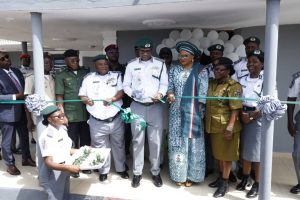…As Volkswagen hopes to bring self-driving cars to market, 2025***
Google on Wednesday launched an improved version of its navigation map, Google Maps, with new features meant specifically for users of commercial buses and the Bus Rapid Transit (BRT) in Lagos.
Mr Jeff Albertson, Senior Product Manager, Google Maps, said at the launch that the improved navigation map was first-of-its-kind in the world.
Albertson said that it was designed to make the transportation experience of commercial bus users in Lagos easier.
He said that unveiling of the Google maps for all forms of transportation was to help people to get to their destinations at an estimated time without bothering the drivers.
“Lagos has a distinct energy, dynamism and vibe that one does not find anywhere and is a very important place for Google Maps.
“What we have built for Lagos is a global first for Google Maps, and is a step toward helping people in many other cities where transport is informally organised as it is in Nigeria.
“This is the first time anywhere in the world that such is being launched; the next step is to get a feedback from the users to improve on their experiences.
“If the feedback is all positive, then, we will move to other places, but it will be a little while before we expand outside Lagos,’’ the Google official said.
He said that the new Traffic tab offered users a snapshot of the information they cared about most such as traffic, weather, bus stops and current expected fare levels for commercial buses, popularly known as “Danfo” in Lagos.
Albertson said that the Traffic tab provided bus riders with information to help them find their most efficient route, both in travel time and transport costs.
According to him, until now, Google Maps users had only been able to access information for other forms of transportation including cars, two-wheelers, BRT and ride hailing.
He said that the product was co-designed with residents of Lagos in an engaging process that brought diverse teams of Googlers to Lagos to interview Lagos residents and local guides.
The product manager added that the process involved googlers understanding local needs, and then, designing something that wove together all the many ways that people move around.
The Google partnered with road peppers to design the new features.
Meanwhile, Volkswagen wants to make self-driving cars a commercial reality by the middle of the next decade, the German carmaker said on Wednesday.
Alexander Hitzinger, VW’s Vice-president for autonomous driving made the announcement in Germany.
Tests have been carried out in Hamburg using five specially-equipped electric Golf models on a 3-kilometre route, which has “road side units” at 14 traffic lights to aid the vehicles.
The cars, which have sensors on the roof, in the fenders and in the front and rear, can so far predict the traffic situation for 10 seconds.
“We are working on a market-ready self-propelled system, which we want to commercialise as early as the middle of the next decade,” Hitzinger said.
But fully autonomous driving on a grand scale – with more than 100,000 vehicles – is “a Herculean task,” he added.
For example, there are an infinite number of traffic scenarios and not all can be covered by algorithms while the systems also have to be able to ward off possible cyber attacks.
Also read: Gold firms as markets await clarity on trade talks
VW, which is cooperating with U.S. manufacturer Ford, believes China and the U.S. will become pioneer markets for self-driving cars but that it will be difficult in Europe to define legal frameworks.
Taxis and delivery vehicles are expected to be among the first wave.
Another problem for the industry is the availability of lithium batteries needed for electric vehicles, which the vast majority of self-driving cars are expected to be.
The German Economics Ministry spoke of its “surprise and regret” on Wednesday at the cancellation of a German-Bolivian joint venture for the production of lithium.
The project between Germany’s ACI Systems and the Bolivian state-owned company YLB was launched just over a year ago, before the Bolivian government recently ended the deal without giving reasons to German authorities.
Additional reports from dpa





















